Students in peril: Stolen focus
This article was produced as a project for the Dennis A. Hunt Fund for Health Journalism, a program of the USC Annenberg Center for Health Journalism.
Other stories in the series include:
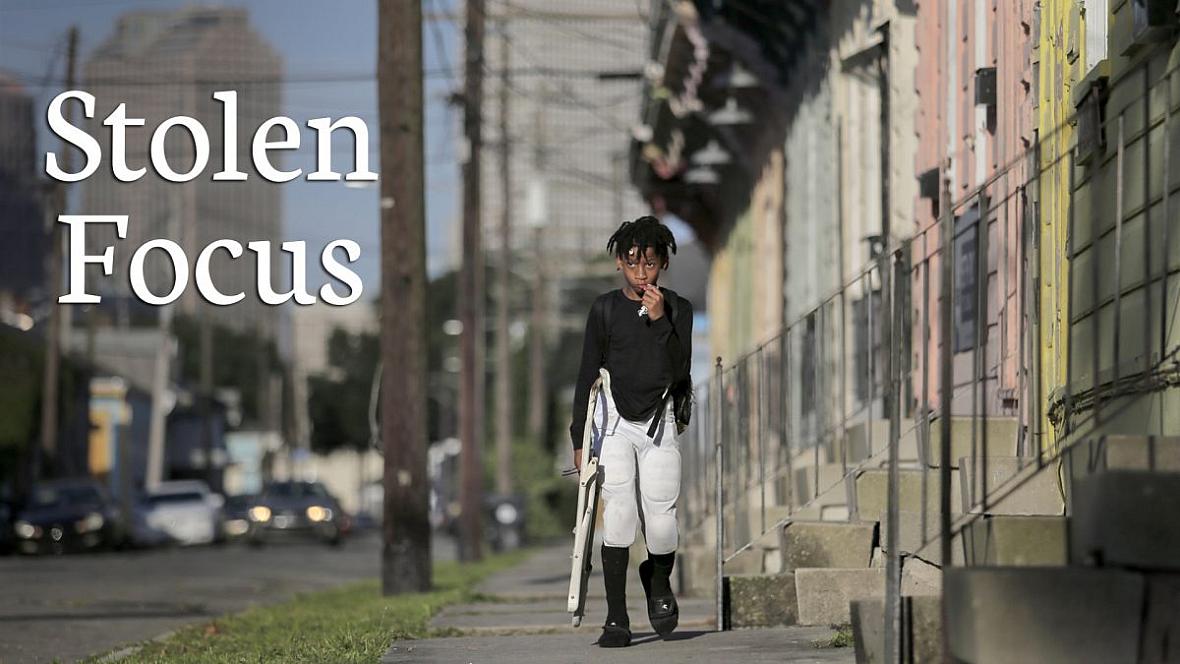
Three months had passed since the boys found their mother lying dead on the kitchen floor, covered in “pink paint,” as 3-year old Ji’Air Luckie described it.
In that brief span, school grades for his older brother, Jerone, plummeted. The once vibrant 7-year-old seemed to retreat into his thoughts. Ji’Air, meanwhile, “just couldn’t function,” said their grandmother, Paulette Young, 57.
“He was always wanting to know where she was, and I guess he wasn’t understanding, so he was acting out,” she said of Ji’Air.
In the immediate aftermath of 24-year-old Cierra Luckie’s killing on June 11, 2011, Young knew the boys needed more help than a grandmother could give. She thought to start at Jerone’s school, Edgar P. Harney Spirit of Excellence Academy, a few blocks from her home. She asked to speak with the school’s counselor.
“I think I need some help,” Young remembered saying. “These kids went through a trauma.”
Every day, across much of New Orleans, children come to school having been exposed to violence. Some, like Ji’Air and Jerone Luckie, witness it up close. Others see it on school bus rides past crime scenes, or hear it in gunshots at night. The trauma of those events can follow them in hallways and classrooms, stealing their focus from the day’s lessons or causing them to lash out at teachers and classmates.
Yet some educators and child psychiatrists say the city’s public schools have historically failed to address the role of trauma in students’ lives, and most remain unprepared for it, choosing to lean on overworked counselors or harsh discipline aimed at what has often been misdiagnosed as a behavior problem.
A relatively new movement among some New Orleans schools is trying to change that, by recognizing the link between trauma and school performance, and helping schools to become safe spaces where traumatized students can get back on track.
Such trauma-informed schools have popped up in school districts from San Francisco to Philadelphia. But adopting that model in New Orleans’ fractured charter school network is arduous work, hampered by a state evaluation system that ties a school’s survival to standardized test scores. It also goes against years of zero-tolerance discipline that became a hallmark of some post-Katrina schools.
New Orleans is in a unique position, with many children who “suffer chronic trauma as a result of living in this city, and it goes largely unresolved in schools,” said Jonathan Johnson, who taught in Central City for four years before starting the small charter high school, Rooted School, on St. Charles Avenue in Uptown.
“By not addressing this in our school system, we’re not preparing them certainly for success through a collegiate system, but furthermore, to take care of themselves and their families,” Johnson said. “We’re just not preparing them to live.”
Paulette Young talks about her daughter Cierra Luckie's 2011 murder and the trauma it inflicted on her grandsons Ji'Air and Jerone, who were 3 and 7, respectively, when they found their mother dead on the kitchen floor.
Ji’Air and Jerone fell asleep watching TV on the floor in the back bedroom of their mom’s Hollygrove home that night in June 2011.
Students walk across the campus at KIPP Central City Primary.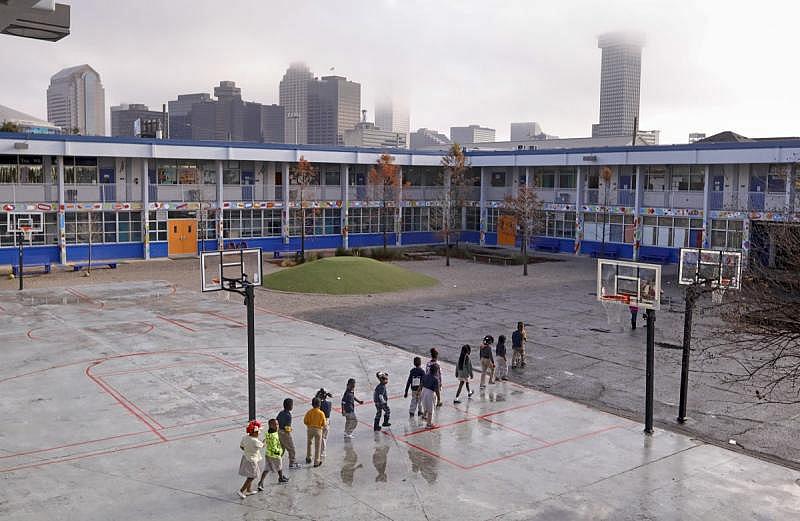
The boys didn’t hear the gunshot in the next room, Young said. Neither did the neighbors. The next morning, Jerone woke up and asked his younger brother if he was hungry. They walked to the kitchen to heat up soup when Jerone spotted the body.
“Come on Ji’Air,” he told his brother, according to Young. “I think mommy’s dead.”
Young said investigators called the gunshot to her daughter’s head a crime of passion. But seven years later, the murder remains unsolved.
Traumatic events like this are all too common in New Orleans. In surveys of more than 300 students from Central City area public schools since 2016, one in five children said they had witnessed a murder, and more than half had someone close to them who was murdered, according to the Institute of Women and Ethnic Studies, a nonprofit public health organization who conducted the surveys.
A single event, like the death of a parent, can cause trauma in a child. So, too, can repeated exposure to violence, child psychiatrists say, even if the exposure is not direct. Poverty, divorce, a parent in prison or substance abuse in the home can also cause trauma.
Some children with trauma have trouble paying attention in class. They put their heads down on their desks and sleep, or break out in tears at seemingly random times. Others may appear quiet, but chew on clothing or pick at their fingernails. More outward signs may include aggressive outbursts: kicking tables and chairs, yelling at classmates or being disrespectful to teachers.
While these reactions might seem self-destructive, they are unconscious defense mechanisms constructed by the brain to ensure survival, said Paulette Carter, CEO and president of Children’s Bureau of New Orleans.
“They’ve adapted exactly the way they’re supposed to adapt,” Carter said of traumatized children. “They have learned through countless exposures they need to be primed and ready to protect themselves.”
Dr. Stacy Drury, associate director of Tulane University’s Brain Institute, illustrated the point. She worked with a child who would jump under his desk every time he heard a loud noise. Drury told the boy’s mother that therapy could stop that behavior.
“Don’t you dare,” Drury recalled the mother responding. “There’s gunfire in my neighborhood and if he doesn’t jump under the table at a loud noise he’s going to get shot.”
Lawrence D. Crocker College Prep counselor Rochelle Gauthier gets a hug from a student during lunch at the school in New Orleans.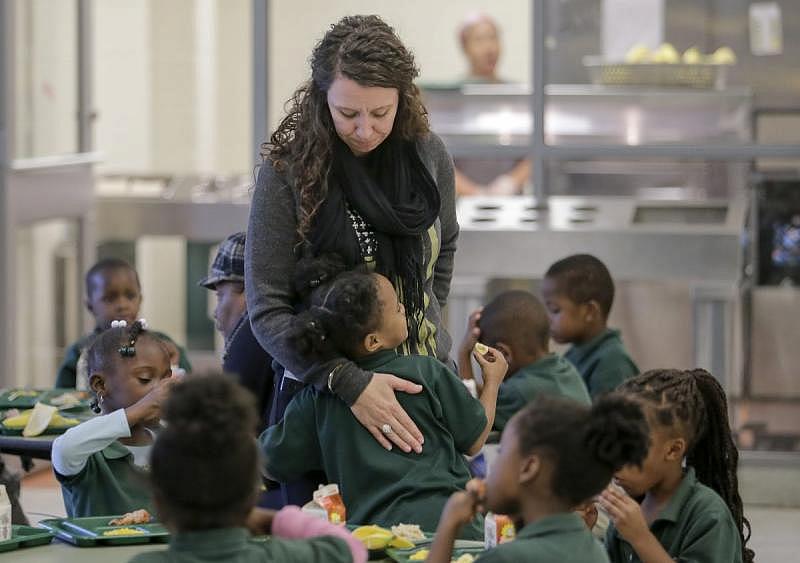
Trauma is often not acknowledged as the root cause of this type of behavior, some educators and child psychiatrists say. A child who can’t focus because of chronic neighborhood violence is instead diagnosed with attention deficit hyperactivity disorder and prescribed medicine that, according to Drury, could do little to help. That child is then sent to the principal’s office or suspended from school as a result of his or her behavior.
In the years after Hurricane Katrina, with the city’s failing public school system essentially dismantled and replaced by dozens of independent charter operators, strict discipline policies were seen by some school administrators as essential to improving both school safety and academic performance.
“You’re talking about schools that were in crisis mode post-Katrina,” said Johnson, of Rooted School. “And in crisis modes, it’s a command-drive style – what I say goes. The question becomes, to what extent are we still in crisis? If we’re not in crisis, why do we continue to operate as if we are?”
Among eight public schools in Central City, some have managed to reduce suspensions in the last four years, and others have not, Louisiana Department of Education data show. But every school except one – James M. Singleton Charter School – has a suspension rate in the last school year that was higher than the state average.
“Folks grab at the lowest hanging fruit,” said Vera Triplett, former Recovery School District deputy superintendent and current founder and CEO of Noble Minds Institute for Whole Child Learning charter school. “What’s the quickest way to remove the problem? Remove the child. Suspension becomes an option because it’s quick and easy.”
Eleven public schools across New Orleans are part of efforts to adopt trauma-informed practices.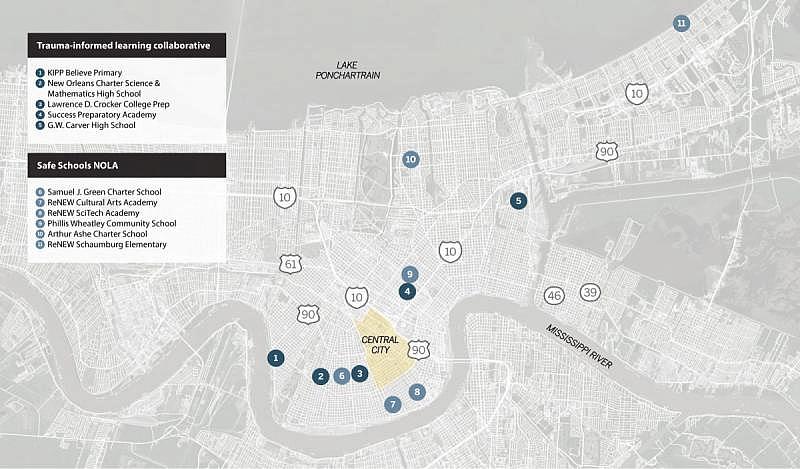
Research suggests suspensions do little to improve academic success. Instead, they disproportionately target children of color and low-income children in Louisiana and across the country, according to a 2017 report from Tulane’s Education Research Alliance for New Orleans.
“Fundamentally, I think there’s still a general belief that black children need to be punished in order to learn,” said Andre Perry, a former New Orleans charter network leader and current fellow at the Brookings Institution.
Five New Orleans schools are taking part in a trauma-informed learning collaborative launched in 2015 by the city’s health department, in collaboration with social service agencies and Tulane University’s psychology department. Initially convened three years earlier to discuss how to help after a single traumatic event – mainly, the death of a student – they soon shifted focus to also addressing chronic trauma among children living with violence and poverty.
“They were doing good clinical work … but then the kids were going back into a school environment that was far from trauma-informed in many situations,” said Kathleen Whalen, a social worker who serves as project director for Tulane’s trauma-informed schools work.
Lawrence D. Crocker College Prep just outside Central City entered the collaborative through the trail blazed by its then-principal, Amanda Aiken. Though unfamiliar with the phrase “trauma-informed schools,” Aiken said she saw anger and pain in her students – several of them with parents or siblings who were murdered.
“It wasn’t like us trying to be cutting edge or innovate. It was: We love our kids, and we see how life is stacked against them, and we know what the alternatives are if they can’t get it right,” said Aiken, who now works as chief of external affairs for the Orleans Parish School Board.
Panthers teammates Michael Pollard, left, and Devin Clayton, center, read during class at KIPP Central City Primary.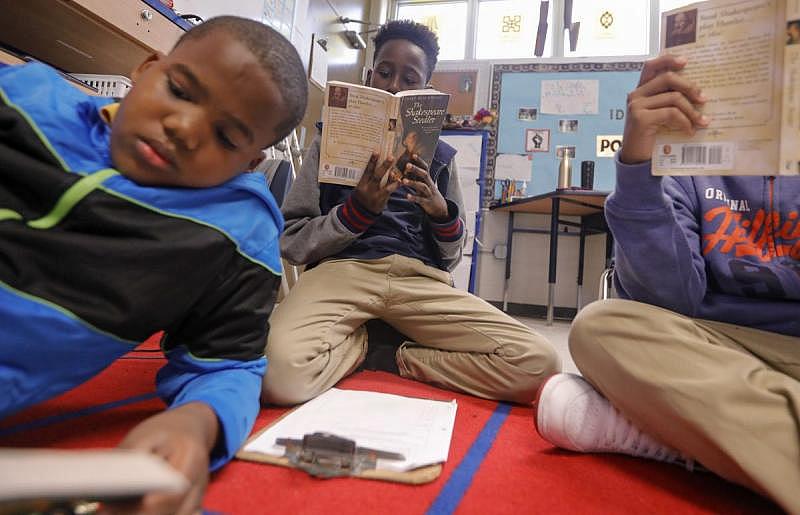
The group paired agencies with schools, to train teachers and to create individualized plans to help students with trauma – as opposed to a one-size-fit-all approach. At KIPP Believe Primary, in the city’s Black Pearl neighborhood, for example, one approach is called “Meaningful Mondays”: Once a month, a teacher spends one hour with one student, who chooses the activity for that hour while the teacher observes and participates if asked.
“It’s training teachers to give their undivided attention to the child and to communicate behaviorally and verbally that I’m paying attention to you and I care about you,” said the school’s psychologist, Patrick Bell.
Some students at Crocker, meanwhile, carry a color-coded card in their pockets, which they can pull out to discreetly show teachers they are struggling and need to take a break at the school’s teacher’s lounge-turned-wellness center for students.
While different, the themes are similar: build safe relationships, recognize subtle and not-so-subtle signs of trauma, teach coping skills for students and staff, move away from harsh discipline policies.
“Trauma-informed approaches say we’re going to change the whole system so it lets every single person who walks in the door of this building — regardless of whether they’ve had trauma or not — be successful, feel safe and be able to thrive,” said Courtney Baker, a Tulane assistant psychology professor and one of the leaders of the effort in New Orleans.
Baker and her colleagues have expanded their work with “Safe Schools NOLA,” a four-year study of trauma-informed practices in six public schools, funded by a $2.6 million grant from the National Institute of Justice.
The grant pushes the total of trauma-informed schools in New Orleans to 11. But that’s not to say other schools in the city are not doing similar work. As Bell notes, some tenets of trauma-informed care mirror those found in other social-emotional behavior models practiced for years in some of the city’s classrooms.
For the 2017-18 school year, KIPP Central City Primary started trauma screenings and counseling groups for students in first and fifth grades, in partnership with Project Fleur-de-Lis, an arm of the Mercy Family Center behavioral health clinic that provides mental health services to schools. KIPP is among a dozen-plus New Orleans schools in which Project Fleur-de-Lis offers group therapy on trauma.
Teacher development continues to be a focus as well, said school principal Theresa Schmitt, with the most recent training centered on being aware of each child’s response.
“It isn’t, ‘I’m a mean child or a bad child,’” Schmitt said of the training’s focus. “It’s potentially their default state, so how do we offer those positive experiences to kind of shift that?”
The conversation around trauma-informed schools gained traction in the late 1990s, after a study by the Centers for Disease Control and Prevention and Kaiser Permanente found a link between childhood trauma and health problems.
Trauma-informed approaches have taken root in school districts in Los Angeles, San Diego and Philadelphia, among others. In 2015, five high school students in California’s Compton Unified School District filed a federal class-action lawsuit arguing the district doesn’t address the needs of students exposed to neighborhood violence and poverty. The case is still being litigated.
Allison French leads her class inside KIPP Central City Primary.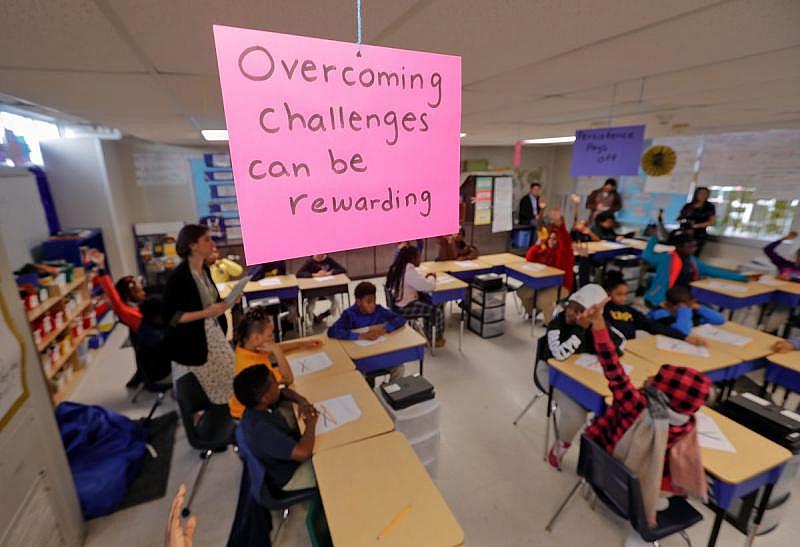
At the state level, Washington and Massachusetts have enacted programs to address trauma in schools. In Missouri, lawmakers in 2016 required the state’s education department to provide trauma training to any school district that requests it, and called for a pilot study at five school districts. The Missouri law was based, in part, on the work of a commission formed after the racially charged police shooting in Ferguson.
Dr. Jerry Cox, a psychologist and member of the task force that led to the legislation, said roughly 80 schools in suburban St. Louis have already taken part in training.
“What it’s really about is supporting kids and how to help kids be emotionally available to learn, but also supporting teachers to be emotionally available to teach,” Cox said of Missouri’s efforts.
Growing trauma-informed practices in New Orleans’ patchwork of independently managed charter schools has obstacles. Unlike in traditional school districts, where policies and money are funneled from the top down, New Orleans’ autonomous charters set many of their own policies. The spread of trauma-informed schools in the city has thus far been driven by grant dollars and by pre-existing connections between social service agencies and staff at those schools.
Some say that helps spread good practices among charters within the same network, such as KIPP schools. Because KIPP has autonomy in decisions for its schools, it can do so with limited red tape, while also tailoring the approach in each school.
“If you have this big sweeping mandate they’ll treat it like that – they’ll do the bare minimum,” said Aiken, Crocker’s former principal. “A mandate can’t speak to the individual kid. It’s not a one size fits all, and the minute people try to make it a one size fits all is the minute it becomes like everything else in education: a buzz word.”
Crocker College Prep principal Nicole Boykins ties a student's shoe for her at the school in New Orleans.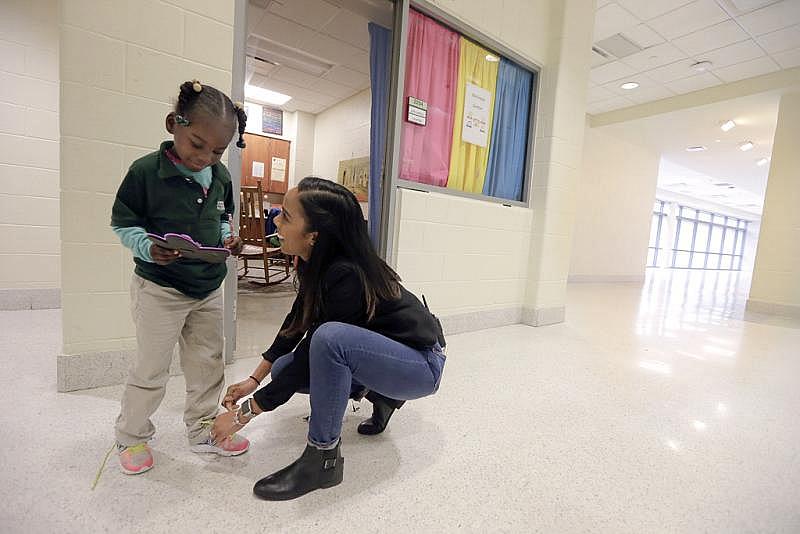
But schools without connections to the experts are missing out on chances to learn how to address student trauma.
“For the schools that are engaged with community agencies like us, they’re doing lots of great work. But there are other folks who are new in town or don’t know, and they’re on an island, which is difficult,” said Project Fleur-de-Lis director Laura Danna.
Then there’s the challenge of the state’s performance evaluations, which assigns a letter grade to each school based, among other metrics, on how students perform on standardized tests. Schools that consistently receive low grades can lose their charters. That pressure can give school administrators pause when considering whether to invest time and money on training that, at least locally, remains a relatively untested approach for student trauma.
As Crocker’s principal Nicole Boykins put it: Every moment a child spends learning how to cope with trauma is a moment not spent learning science or math that will be on the test.
That student “is a better person and she is going to be able to function,” said Boykins. “But academically she’s missed all this stuff she’s going to be tested on, because we still live in this world of standardized tests.”
Proponents argue that trauma-informed practices will help schools get better grades once those practices are given time to take hold in every classroom. Investing that time is what’s hard for some schools.
“It’s hard for schools, especially for schools where their charter is up this year, or they’re against the wire and so they’re having to make choices that are best in the short term. You’re looking at three to five years to really see progress. That’s a hard thing for anybody to sign up for when you’re on the chopping block,” said Danna.
But the biggest challenge, proponents say, is changing the mindset that harsh discipline — for years thought to curb problem behaviors and keep schools safe — is not the right approach for trauma.
“There are people who do not believe that trauma and how it impacts a child’s brain is a real thing,” said Noble Minds Institute’s Vera Triplett. “I could pick those people out in every school I went to. They think this is a bad kid and that kid needs more discipline or their parents just don’t care and they’re not doing enough.”
Still, said Triplett, the obstacles are not insurmountable.
“This is the result of a failed education system and a failed economic opportunity system,” she said. “So, now to say that the issues that adults created and caused for these kids, now these kids are on their own – that’s not the answer.”
It’s the day before Thanksgiving and Paulette Young is in her kitchen keeping an eye on sweet potato pies baking in her oven. Two rooms away, her grandsons, Ji’Air and Jerone, play video games from their beds on opposite sides of the room, while also watching YouTube clips of video games streaming on their phones.
That preoccupation with video games was one of the main reasons why, last summer, Young walked to nearby A.L. Davis Park to sign Ji’Air up for the park’s football team for kids ages 9 and 10.
Ji'Air Luckie, 10, chats with his grandmother, Paulette Young, as he laces up his shoes for football practice at A.L. Davis Park in Central City.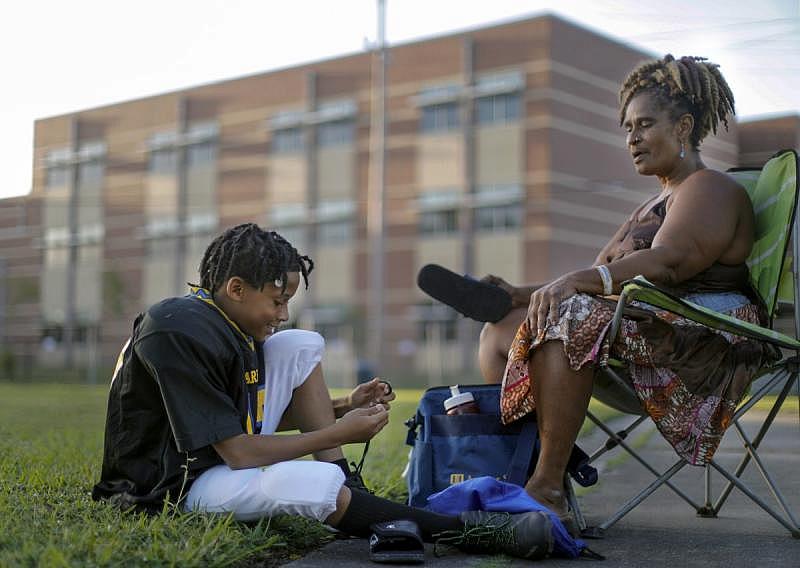
“I had to pull him out of this and that,” she said, pointing to the small television and video game console at the foot of Ji’Air’s bed.
Young is among the few parents or grandparents at every practice, unfolding her green lawn chair in the shade of a tree along Third Street, where she can keep watch over the team and on the basketball court, where Jerone plays.
“What I want him to get out of it is discipline,” she said of Ji’Air playing football. “And the social part of it – being with other people.”
Young said her grandsons have come a long way since that day in 2011 when, after their mother’s killing, Young spoke with a school social worker who connected the boys with mental health counselors at Children’s Bureau of New Orleans.
Ji’Air, 10, has been on medication for ADHD, but Young says she wants to talk to a doctor about weening him off it. He still has moments of anger and frustration that seem to bubble up at random. But, taking a break from his video game, he proudly displays his report card – straight A’s – and the blue sash he earned for being November’s student of the month at Mahalia Jackson Elementary School.
Now 14, Jerone has shown improvement in school, though he still struggles with certain subjects. He keeps busy playing percussion and football. Last year, he wrote a poem about his mom’s death, entitled “My Heart.”
Standing in his bedroom doorway, with Young nearby fighting back tears, Jerone recites the poem, which begins:
Your death hit me hard
Life surely dealt me some very bad cards
Now here I sit, stuck in time
Can’t ever get you off of my mind
Hard to close my eyes
Face is wet know that I cry
Hard to get good sleep
Swimming in the water way too deep


